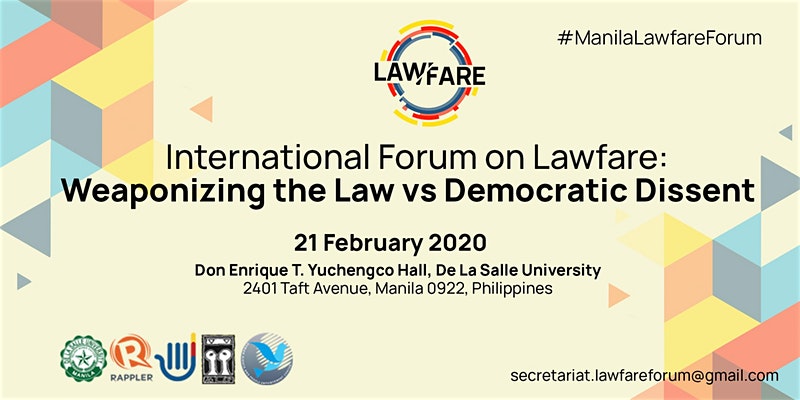[LIVE] Int’l Forum on Lawfare: Weaponizing the Law vs Democratic Dissent
Understanding ‘lawfare’ and unpacking the stories and experiences against the weaponization of the law are among the topics to be discussed at the Manila leg of the international forum, to be held at De La Salle University on February 21
Rappler.com
Published 1:01 PM, February 21, 2020Updated 10:12 PM, February 22, 2020FacebookTwitterRedditEmail

MANILA, Philippines – Legal experts, civil society organizations, and sectoral groups gather in an international forum on Friday, February 21, to tackle how the law is being used to muzzle democratic dissent.
The International Forum on Lawfare: Weaponizing the Law vs Democratic Dissent will be held at the Teresa Yuchengco Auditorium in De La Salle University in Manila, where experts and various groups would discuss the implications of “lawfare” – described as the perversion of the law and its weaponization as a tool to silence dissent.
The forum is organized by De La Salle University, Alternative Law Groups, Human Rights and People’s Empowerment Center, and Committee for the Freedom of Leila de Lima, in partnership with online news site Rappler.
There will also be simultaneous breakout sessions in the whole-day event that puts the spotlight on lawfare and its relation to law practice, media, the political opposition, civil and political rights, religion and economic, and social and cultural rights with subsections including women, youth, and LGBT. There will also be sessions on labor, the urban poor, and agriculture.
The phenomenon of lawfare is known globally. The Inter-Parliamentary Union (IPU) Committee on the Human Rights of Parliamentarians dealt with a total of 564 cases of human rights violations against parliamentarians from 43 countries in 2018 – twice the figure recorded in 2013. The cases are mostly in Asia and the Americas.
Lawfare in the Philippines
The Philippines has also witnessed state weaponization of the law against activists, journalists, and opposition leaders, more recently under President Rodrigo Duterte.
Duterte’s critics have faced legal challenges among them Senator Leila de Lima, detained for nearly 3 years over drug charges widely believed to be concocted to silence her. She had decried this as political persecution stemming from her vocal opposition to the government’s bloody campaign against illegal drugs.
Former chief justice Maria Lourdes Sereno was ousted from office through a quo warranto petition – a move perceived by many as the culmination of the Duterte administration’s efforts to unseat her. It marked the first time for the Philippine High Court to remove its own chief, a process that had been strongly criticized as it violated Sereno’s constitutional right to an impeachment proceeding.
Like De Lima, Sereno had also drawn the ire of Duterte for criticizing Duterte’s anti-drug policy, including his public release of unvetted drug lists.
Another administration target is former senator Antonio Trillanes IV who was recently charged with conspiracy to commit sedition over the “Bikoy” narcolist videos. His long-dismissed rebellion case was reopened after Duterte signed Proclamation No. 572 that attempted to void the amnesty granted to him in 2010.
Journalists are also on the receiving end of Duterte’s attacks.
Rappler and its reporters have become subjects of attacks – both online and offline – for critical reports about the Duterte administration’s drug war. Maria Ressa and several other Rappler executives have had to post bail numerous times since 2018 for a slew of harassment suits filed against them and the company.
Aside from the political opposition, some members of the Philippine clergy have also been subjected to persecution and harassment. Priests including Fr Flaviano Villanueva and Albert Alejo were charged with conspiracy to commit sedition for their alleged participation in the so-called Bikoy videos.
Through the lawfare forum, organizers intend to enlighten the public about the pandemic of lawfare and consolidate multisectoral approaches and efforts to fight it.
Other aspects of the forum will also highlight the so-called “red-tagging” of civil society organization leaders and human rights activists. The economic and social costs of lawfare against civil, political, and cultural rights will also be tackled.
Speakers at the forum include Sereno, former UP law dean Pacifico Agabin, and Free Legal Assistance Group (FLAG) chairman Jose Manuel “Chel” Diokno, among others.
Foreign experts and personalities are also expected to join the event, including United Nations special aapporteurs and other foreign political leaders.
Around 500 attendees from different universities including law schools, lawyer groups, media, nongovernmental organizations, and civic groups are expected to attend the event. Those interested to jointhe forum may register here. – Rappler.com